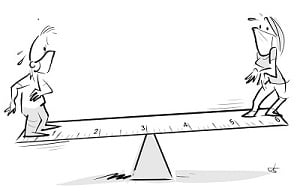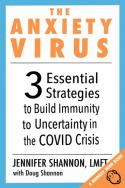Social Anxiety During COVID-19
Social Anxiety During COVID-19

In the grocery store, you are told to stand back on the red line. You feel ashamed for not seeing it in the first place.
You tell your in-laws you are not comfortable having them visit their grandchildren in person, and you worry that they may never forgive you.
Someone asks you to stand farther away from them, and you feel embarrassed for making them feel uncomfortable.
You leave your house to go for a walk, wondering if you should wear a mask all the time, or just when you can’t maintain a safe distance. You feel anxious and unsure.
You reach out to pet a friendly dog, and when the owner asks you to please not touch their dog, you feel hurt.
You are wearing a mask while out on a walk, when a tickle in your nose brings on a loud sneeze. You look around guiltily to see if someone is angry for you possibly spreading germs in public.
Even if you didn’t have social anxiety before COVID, you probably have it now!
Social anxiety is defined as the fear of being judged, criticized or rejected by others. Those of us with social anxiety think that if we do things just right, we can avoid disappointing others and escape the dreaded possibility of being judged. Immunity from others’ judgements is always an unrealistic expectation, and now, with the rules changing, and a variety of opinions about what is safe, it is even more impossible.
Since we are bound to make mistakes following rules, and upset strangers, friends and family, this crisis is an opportunity to build some resilience to others’ judgments.
Three Essential Strategies to Decrease Social Anxiety
- Set a realistic intention when you venture out in public. It is impossible to follow rules that will please everyone, so instead, follow the rules that make the most sense to you based on recommendations from reputable sources. Expect and accept that others may not approve, adopting the expansive mindset -If I displease someone, I can forgive myself, whether they forgive me or not.
- Curb the urge to seek reassurance from others that you are doing the right thing. Getting reassurance reinforces the belief that if we do everything right, we will avoid criticism. True confidence comes from allowing for mistakes and accepting that we cannot please everyone.
- Allow any feelings of shame and embarrassment that arise to dissipate on their own. Negative emotions are not a sign that you have done something wrong. It is natural and inevitable that we will feel uncomfortable in uncertain social situations. When we open to uncomfortable emotions, rather than contract or try to distract ourselves from them, they will change more quickly.
To help yourself learn to welcome uncomfortable feelings that may arise from socially distancing situations where you feel anxious, download this imaginal meditation, Be All Right, Even When You’re Wrong.
There has never been a better time than now to practice self-compassion and tolerance for others’ judgements. Using these three strategies, we can gain confidence that empowers us to be more comfortable, more authentic in social settings. That’s confidence we’ll be grateful for long after this crisis passes!
This blog post was posted on May 26, 2020.

THE ANXIETY VIRUS: 3 Essential Strategies for Building Immunity to Uncertainty in the COVID Crisis
Now available both in Kindle and paperback format












